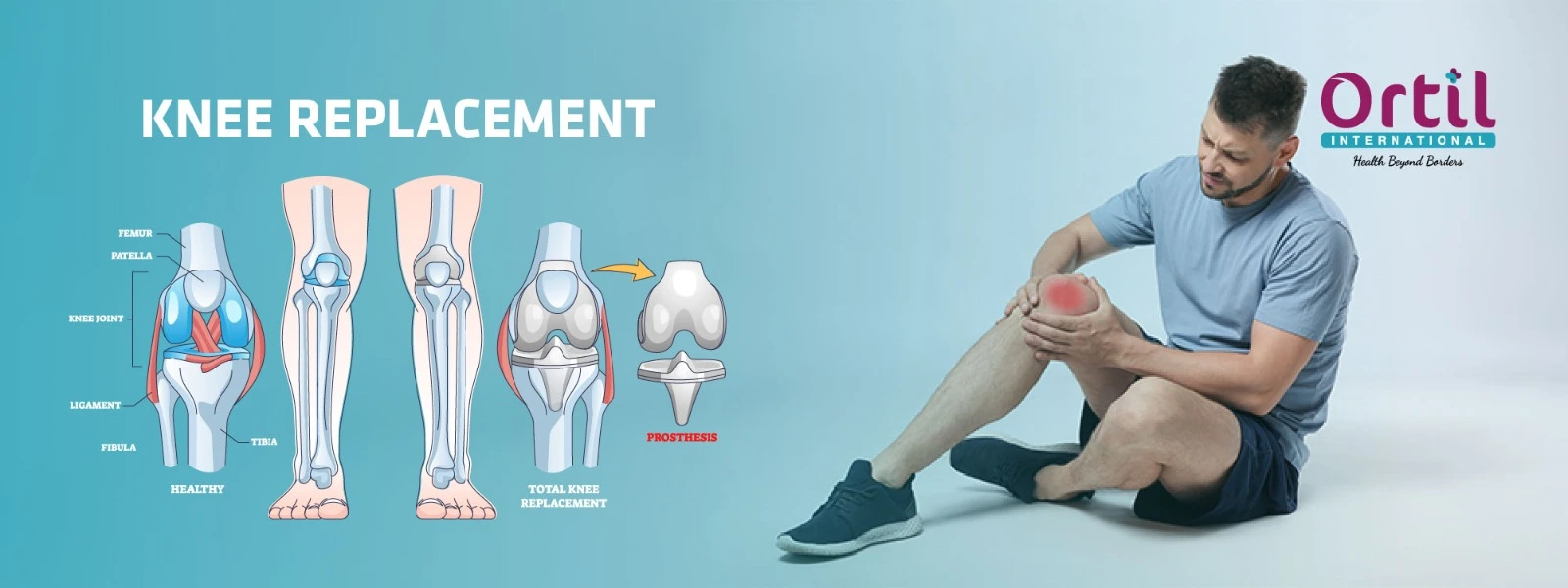What is the Success Rate of Knee Replacement in India?
India is known as a prominent destination for a healthcare system that provides quality treatment to patients across the globe. In India's healthcare system, the orthopedic department has gained much attention due to the availability of experienced medical professionals and advanced techniques. One of the most common procedures in orthopedic treatment in India is Knee Replacement, which has very high success rates in India.

Let’s explore the procedure of knee replacement in India and the associated information in the orthopedic department of the healthcare system in detail.
Why is Knee Replacement Needed ?
A knee Replacement procedure is required when the structure of the knee joint or the bones that form the knee joint become partially or completely damaged. The joint becomes damaged due to some diseases, and osteoarthritis is one of the most common diseases in which a knee replacement procedure is performed. But it can also be performed in other diseases. Some of the indications of knee replacement are as follows:
- Osteoarthritis of the knee
- Rheumatoid arthritis
- Post-traumatic arthritis
- Knee deformity (such as bowing in or out)
- Failure of non-surgical treatments (like medications, physical therapy, or injections)
- Severe knee pain interfering with daily activities
- Loss of knee function and mobility
When is Knee Replacement Recommended ?
Usually, when patients experience pain in the knee joint, medical professionals treat them with non-surgical interventions such as medications, injections, and physical therapy. When the long-term use of these interventions fails to improve the symptoms, then doctors decide to go for surgical interventions. If you have chronic pain that does not go away with the help of medications and physiotherapy, then you should undergo a knee replacement procedure.
You may be recommended a knee replacement procedure if:
- You have limited mobility in your knee joint.
- You have stiffness or severe swelling in your knee joint
- You have chronic pain
- You have low-life quality
- You may find it difficult to sleep because of severe knee pain
- You have limited activities of daily living
- You have no social interaction
What Type of Knee Replacement is Most Successful ?
There are many replacement procedures, such as partial knee replacement, total knee replacement, and revision knee replacement. Out of these procedures, the most successful procedure is the total knee replacement procedure or TKR.
Total Knee Replacement (TKR) was started in 1968 as traditional open surgery, but now, due to medical advancements, healthcare professionals have made many changes to the procedure of TKR. They have replaced knee joints with artificial implants that are similar to the original knee joint and perform their functions.
TKR is one of the safest and most effective surgeries and has 90 to 99 % success rates, and about 85 to 90% of TKR implants can survive for 15 to 20 years. During TKR, a surgeon replaces the damaged parts of your knee with an artificial implant according to your knee's natural structure.
Post-Surgery Rehabilitation Influencing the Success Rate of Knee Replacement in India
Physical therapy after total knee replacement surgery is essential for recovering strength, flexibility, and function. Physical therapists help patients with exercises to improve the range of movement of the knee joint, which ultimately enhances the quality of life of patients. Patient education during rehabilitation is an important part of recovery.
Rehabilitation after surgery affects the success rates of knee replacement because it has the following benefits:
Pain Management : Rehabilitation after surgery usually involves various techniques like manual therapy and exercises that reduce the pain and swelling of the patient.
Improved Range of Motion : Physical therapy helps the patient regain a normal range of movement so that the patient can perform normal activities of daily living.
Muscle Strengthening : Physical therapists also improve the strengthening of muscles around the joint, which can improve the functioning of the joint.
Functional Training : Exercises are designed to prepare patients for daily activities and sports without discomfort.
Gait Training : In rehabilitation, patients learn walking patterns and proper alignment, which reduces the chances of stress on the knee and lowers the risk of injury.
Personalized Care : Treatment plans are designed according to your specific condition, goals, and progress. It increases the effectiveness throughout the rehabilitation process.
All the benefits mentioned above are the key elements from which the success of knee replacement can be declared. As rehabilitation improves these outcomes, it is confirmed that rehabilitation after surgery surely affects the success of knee replacement.
Benefits of Successful Knee Replacement Surgery
Knee replacement is one of the major surgeries, but fortunately, India offers high success rates of knee replacement. Mostly, patients regain the normal functioning of the knee joint after knee replacement, which ultimately improves the quality of life of the patient. A successful Knee replacement surgery has the following benefits:
- Decreased knee pain
- Improved mobility and range of motion
- Enhanced ability to perform daily activities
- Better joint function and stability
- Correction of knee deformities
- Increased independence
- Improved quality of life
- Reduction in inflammation and swelling
- Enhanced participation in recreational activities
- Long-term durability and reliability of the knee implant
FAQ's of Success Rate of Knee Replacement
How Successful is Knee Replacement Surgery in India?
Knee replacement surgery in India is highly successful and offers 90% to 99% success rates.
What Percentage of Knee Replacements are Successful?
Knee replacement surgery has a 90 to 99 percent chance of success.
Is Knee Replacement High-Risk Surgery?
Knee replacement is associated with risks like bleeding, damage of implants, or infections, but due to the advancements in medical technology and the availability of experienced surgeons, the risks can be managed easily.
How Long does it generally take to walk after Knee Replacement?
The patient can start to walk within 24 hours of surgery, and then, according to the recommendation of physiotherapists and surgeons, the patient should perform activities for 30 minutes in the early phase of recovery.


























